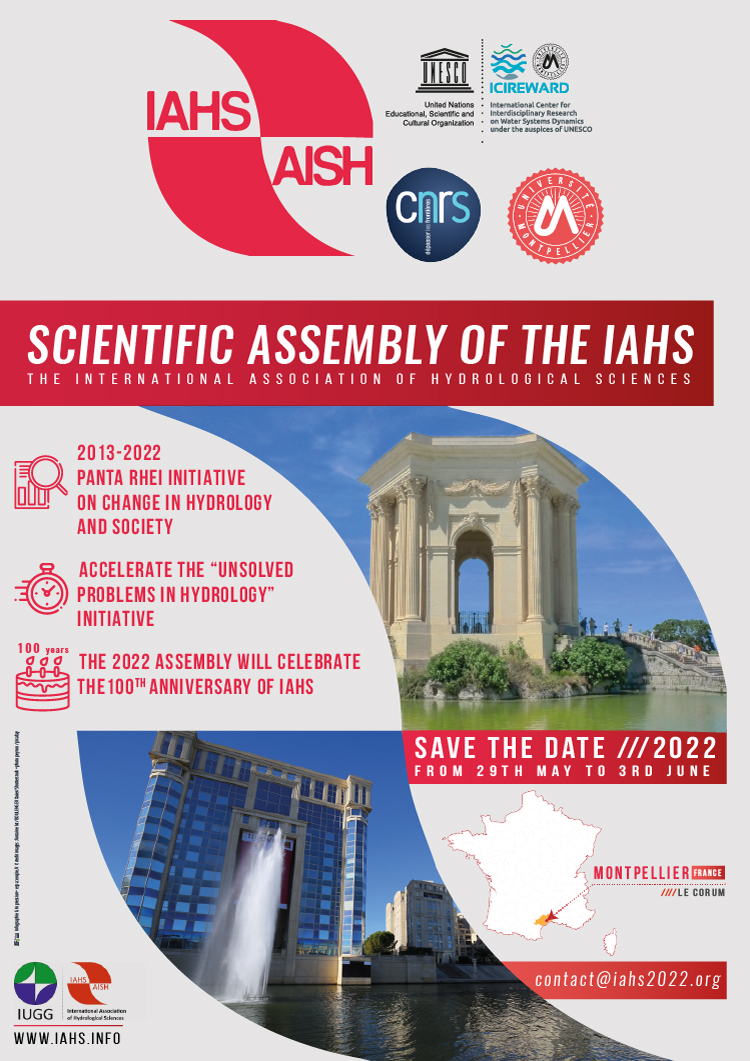IAHS News
Launch of the United Nations World Water Development Report 2021 on Valuing Water
Today, the United Nations World Water Development Report 2021 on Valuing Water, the UN-Water flagship Report on water issues, was published by UNESCO and coordinated by the UNESCO World Water Assessment Programme.
The Report assesses the current status of and challenges to the valuation of water across differing sectors and perspectives and identifies ways in which valuation can be promoted as a tool to help achieve sustainability.
IAHS contributed to chapter 5 (Food and agriculture) and chapter 11 (Knowledge, research and capacity development as enabling conditions).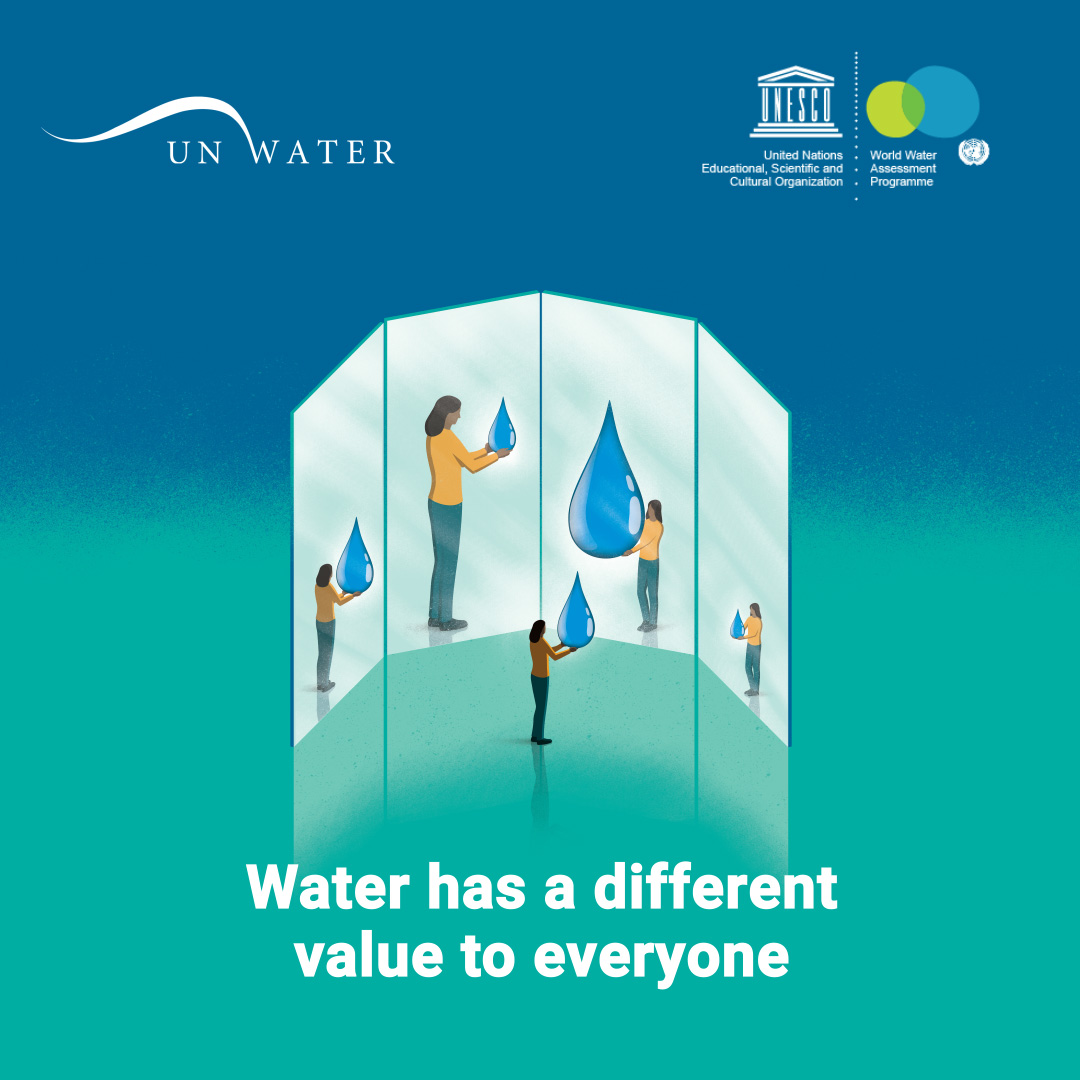
The Report is available for free download, in English, French and Italian.
The Executive Summary is available in 11 languages.
The Audiobook of the Executive Summary is available in 4 languages.
Hydrological Sciences Journal 2020 Awards
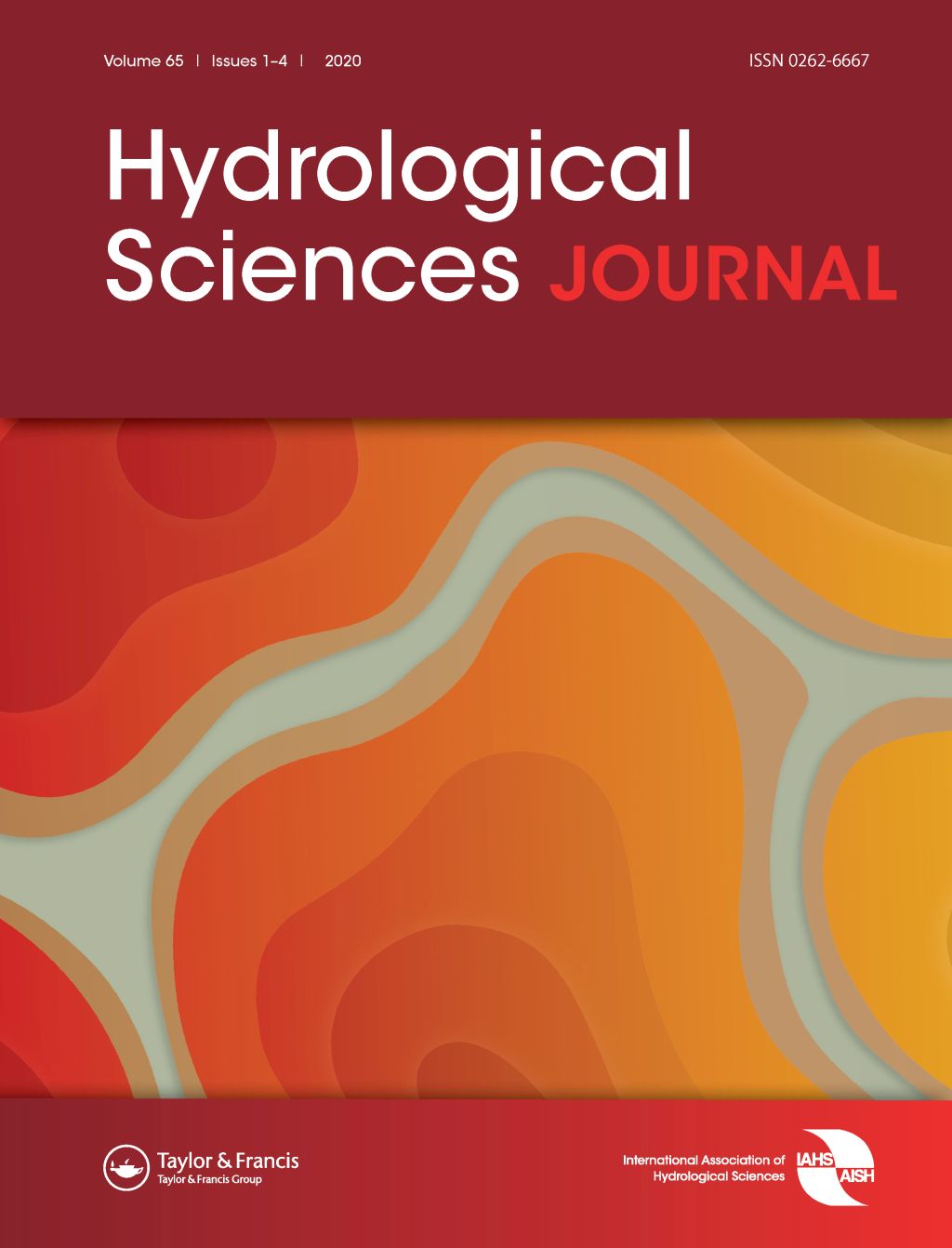 Hydrological Sciences Journal (HSJ) is the official Journal of the IAHS and provides a forum for original papers and for the exchange of information and views on significant developments in hydrology worldwide. It is published by Taylor & Francis and is available online and in print format.
Hydrological Sciences Journal (HSJ) is the official Journal of the IAHS and provides a forum for original papers and for the exchange of information and views on significant developments in hydrology worldwide. It is published by Taylor & Francis and is available online and in print format.
We recognise the time and effort provided by our editors and manuscript reviewers in supporting authors to produce better papers, and it is with this in mind that we recently announced new awards:
1. The Hydrological Sciences Journal Associate Editor Award is granted for outstanding overall contribution to the journal’s impact and visibility, and excellence in supporting authors and editors through the peer review process. The award (a significant cash prize) is granted annually by IAHS, with the support of Taylor & Francis, to one Associate Editor identified by the HSJ Editors. In 2020 it was awarded to Konstantinos Soulis (Greece).
2. The Hydrological Sciences Journal Reviewer Award is granted for outstanding contribution to the journal, and excellence in supporting authors and editors with timely and relevant reviews. The award (comprising a cash prize and book tokens) is granted annually by IAHS, with the support of Taylor & Francis, to reviewers identified by the HSJ Editors. In 2020 awards were granted to Ozgur Kisi (Turkey) and Andrzej Walega (Poland).
Our congratulations go to all of our awardees.
2020 IAHS Tison winners announced
IAHS are pleased to announce that the 2020 Tison award goes to Eleni Maria Michailidi (Greece) and Sylvia Antoniadi (Greece) for their work on the 2018 Hydrological Sciences Journal paper:
Eleni Maria Michailidi, Sylvia Antoniadi, Antonis Koukouvinos, Baldassare Bacchi & Andreas Efstratiadis (2018) Timing the time of concentration: shedding light on a paradox, Hydrological Sciences Journal, 63:5, 721-740, DOI: 10.1080/02626667.2018.1450985
The paper was co-authored by Antonis Koukouvinos (Greece), Baldassare Bacchi (Italy) & Andreas Efstratiadis (Greece) who are not eligible for the Tison Award, age-wise.
This award is prestigious with a 1000 US$ prize and a 1 year subscription to HSJ sponsored by Taylor & Francis the publisher of Hydrological Sciences Journal.
The paper is free to access at https://www.tandfonline.com/doi/full/10.1080/02626667.2018.1450985
The IAHS Tison Award, established in 1982, aims to promote excellence in research by young hydrologists. The Award is granted for an outstanding paper published by IAHS in a period of two years previous to the deadline for nominations. The description of the award is available at https://iahs.info/About-IAHS/Competition--Events/Tison-Award.do
Frances Watkins, Editorial Manager of HSJ, retires
After 27 years dedicated contribution to IAHS and its official journal, Hydrological Sciences Journal (HSJ), Frances Watkins retires on 26 February 2021.
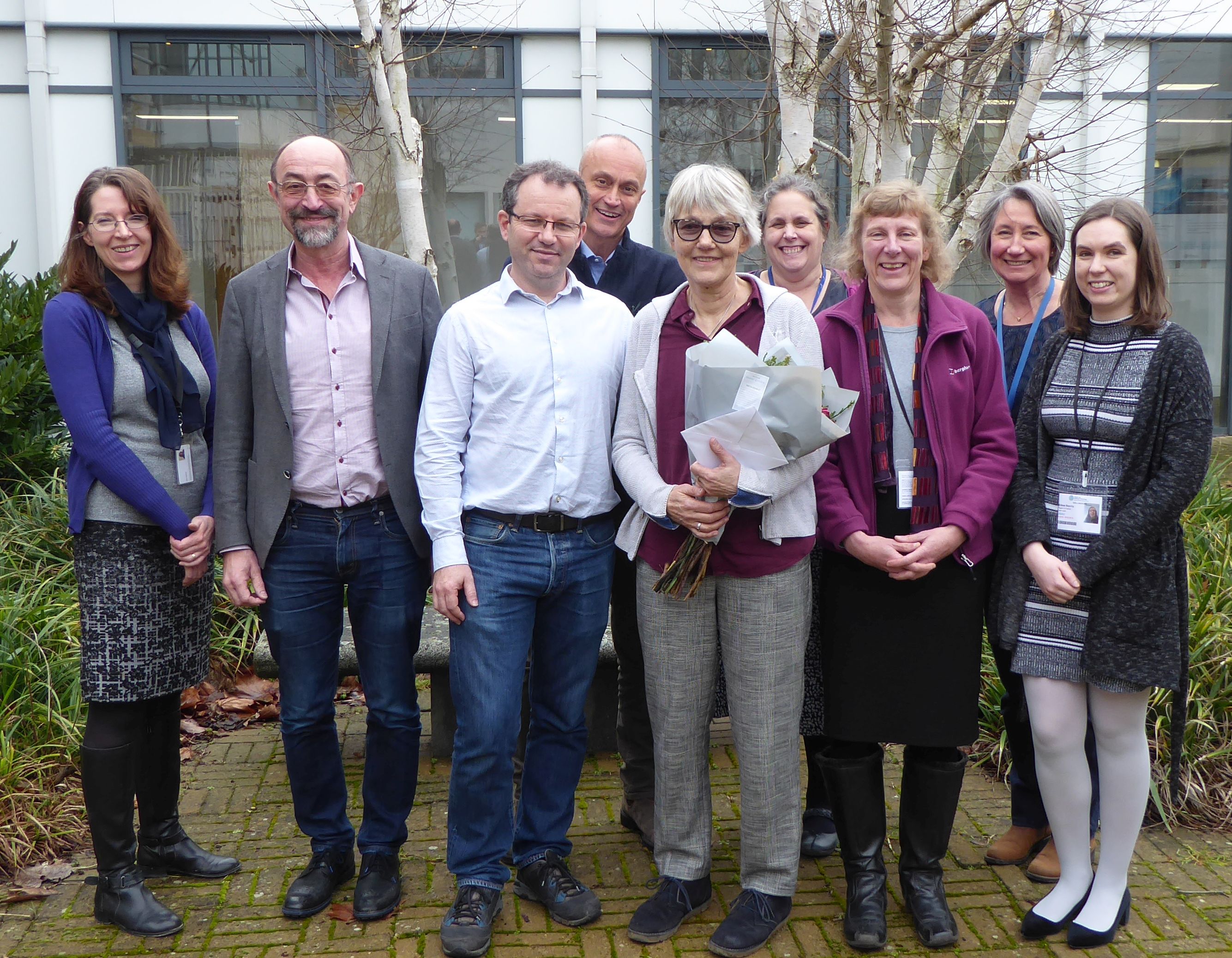
Pictured left to right - Sara Rafferty (HSJ Editorial Assistant), Günter Blöschl (President IAHS), Christophe Cudennec (Secretary General IAHS), Attilio Castellarin (Editor-in-Chief HSJ), Frances Watkins (HSJ Editorial Manager), Helen Houghton-Carr (Company Secretary IAHS), Kate Heal (Treasurer IAHS), Claire Lupton (Executive Secretary IAHS) and Eilise Norris (Managing Editor Agriculture, Environment and Water for Taylor & Francis) in 2019.
There have been many changes in IAHS, HSJ and publishing over the past 27 years, but one constant – in addition to Frances - has been the location of the IAHS Office in Wallingford, UK, formerly the Institute of Hydrology (now the UK Centre for Ecology & Hydrology), where Frances joined Penny Kisby and Jill Gash in November 1993. Frances’ first project was HSJ volume 39 (1994), which included 6 issues and about 700 pages. In those days papers arrived as hard copies by post, and were typed-up and edited in WordPerfect 5.1. To indicate the scale of changes since, the latest HSJ volume 65 (2020), contained 16 issues and 2826 pages, all handled electronically. The number of Associate Editors has increased from 30 to 60 and there are now three HSJ Co-Editors – Attilio Castellarin, Stacey Archfield and Aldo Fiori – building upon the advances of previous Editors - Terence O’Donnell, Zbigniew (Zbyszek) W. Kundzewicz, Demetris Koutsoyiannis, Mike Acreman and Ross Woods. To support the growth of HSJ, Sara Rafferty joined the IAHS Office as Editorial Assistant in 2017, focussing on the processing of papers and communications with Associate Editors and reviewers under the management of Frances.
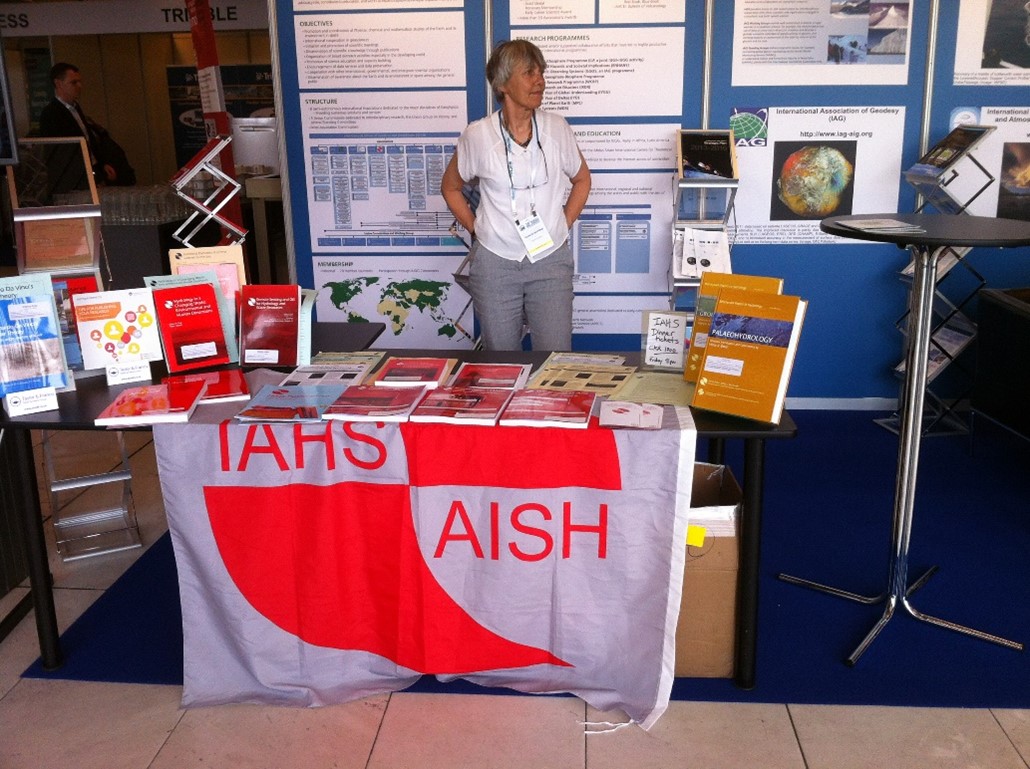
The continued growth and success of HSJ over the past 27 years, whilst maintaining high scientific and linguistic standards, would not have been possible without Frances. Frances is renowned for her English language skills, high quality of work and attention to detail. She has used these to support the publication of papers from hydrologists all around the world, especially early career scientists, thus helping IAHS to fulfil its charitable mandate. As well as her HSJ duties, Frances worked on the production and copy editing of many IAHS Red Books. Frances has also developed excellent relations with Taylor & Francis, publishers of HSJ since 2010, who provide valuable expertise and promotion of HSJ, and now do most of the copy editing. Through all these activities, Frances supported Cate Gardner, who followed Penny Kisby as Manager of IAHS Press, until Cate’s retirement in 2015.
Following the reorganisation of the IAHS Office under Cate’s leadership and the appointment of Claire Lupton as IAHS Executive Secretary in 2015, Frances has helped Claire maintain the friendly and efficient reputation of all IAHS operations. Many will recall Frances not just from her beautifully written emails, but from meeting her in person at the IAHS stand at Scientific and General Assemblies, or at HSJ editorial retreats.
As with her careful work for HSJ, Frances’ retirement has been well-planned and organised. Frances gave advance notice of her intentions, enabling IAHS to appoint Lottie Rundall as HSJ Editorial and Production Coordinator in January 2020. This has allowed a 1-year handover to tap Frances’ encyclopaedic knowledge of HSJ before Lottie took over the HSJ Editorial Manager role.
Frances’ inputs to HSJ and IAHS have been outstanding over the past 27 years. She has overseen the publication of over two-thirds of HSJ pages ever published and tirelessly mentored HSJ Authors, Associate Editors, and Editors. Frances has achieved all this with her characteristic warmth and empathy, making the HSJ Editorial Team feel like a welcoming family. All the IAHS staff, HSJ Editors and Associate Editors, IAHS Officers past and present, and HSJ Authors send their best wishes to you, Frances, as you embark on a well-deserved retirement.
Kate Heal
Chair IAHS Ltd.
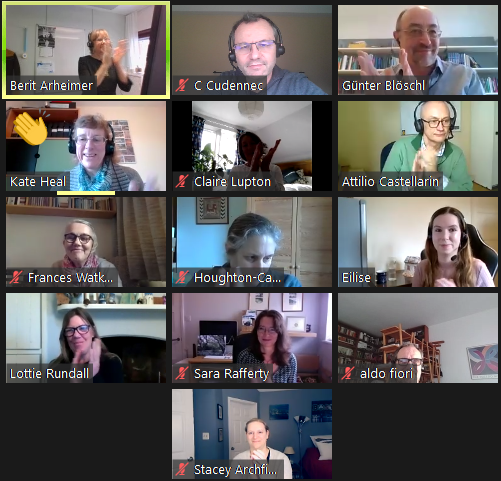
Obituary: Jim Shuttleworth
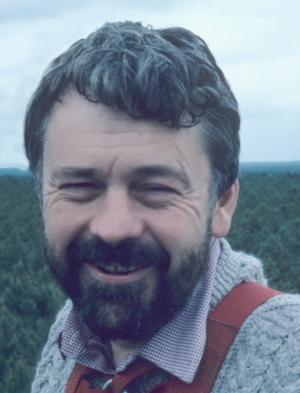
One of hydrology’s most eminent trail-blazing scientists, William James (Jim) Shuttleworth, an incredibly warm, kind and compassionate person, sadly passed away on 20th December 2020 at the age of 75.
Jim arrived at the UK Institute of Hydrology in 1972: with a nuclear physics background, he looked at hydrology with fresh eyes.
He was recruited to work on a project making Bowen ratio measurements of forest evaporation. Faced with the difficulty of measuring the very small temperature and humidity gradients found above forest, Jim rapidly concluded that there must be an easier way. The strongest candidate was the eddy-correlation method and Jim’s vision saw a minimalist battery-powered instrument that could operate continuously in remote places.
The successful development of this instrument transformed our ability to measure evaporation. The over 300 Fluxnet stations now using this approach have a provenance traceable back to Jim’s original device.
When an opportunity arose to exploit the new instruments measuring Amazonian evaporation, Jim grabbed it. Others saw the project in terms of understanding the water balance of the rainforest, but Jim recognized it as an opportunity to pioneer a new field of global hydrology, combining hydrological measurements with new global models.
In the early 1980s, with Global Circulation Models, in their infancy, only a handful of visionaries believed in their potential to predict future climate. An early application was to predict the climatic consequences of deforesting the Amazon basin. Yet the representation and parameterization of the forest in these models was basic — often just guesswork. By linking directly to scientists at NASA and the UK Met Office Jim ensured that the Amazonian demonstration of how micrometeorological land surface flux measurements could anchor models to the real world, was rapidly incorporated into the new GCMs, thus kick-starting many other international experiments.
Jim joined the Department of Hydrology and Water Resources at The University of Arizona in 1993, ultimately becoming Regents Professor. He created their first degree programme in hydrometeorology, writing the definitive textbook on the subject, and instigating their Hydrology and Atmospheric Sciences (HAS) programme.
Jim maintained his theoretical ability throughout and among his 200 scientific publications - "Evaporation From Sparse Crops - An Energy Combination Theory" has been cited over 2000 times.
Among his many international recognitions are the International Hydrology Prize in 2006, and the AGU Robert E. Horton Medal in 2014 for “outstanding contributions to hydrology.” (https://profiles.arizona.edu/person/shuttle)
Jim is survived by his beloved wife Hazel, three of his four sons and one daughter, fifteen grandchildren, and three great-grandchildren. And, of course, by those of us lucky enough to have had him as one of our dearest friends, who will all miss him very deeply.
Colin Lloyd, Jim Wallace and John Gash
Figure caption: Jim Shuttleworth on the Les Landes forest tower during HAPEX-MOBILHY, in 1986.
IAHS related sessions at the upcoming virtual EGU General Assembly (19-30 April 2021)
We would like to draw your attention to two IAHS related sessions in the Hydrological Sciences (HS) programme at the upcoming virtual EGU General Assembly (19-30 April 2021) related to the Unsolved Problems in Hydrology (UPH) initiative and the Panta Rhei decade.
HS1.2.3 Pathways towards solving the Unsolved Problems in Hydrology (UPH)
https://meetingorganizer.copernicus.org/EGU21/session/39751
The IAHS in collaboration with the Hydrology Divisions of EGU and AGU as well as the IAH, launched in 2017 a public consultation process for compiling a list of unsolved scientific problems in hydrology which resulted, in 2019, in a set of 23 Unsolved Problems in Hydrology (UPH) (see https://doi.org/10.1080/02626667.2019.1620507).
The UPH are articulated around 7 themes: Time variability and change, Space variability and scaling, Variability of extremes, Interfaces in hydrology, Measurements and data, Modelling methods, and Interfaces with society. Some of the UPH may have already been partially studied. Recent research may shed light on how to move forward in a more holistic way. A crucial issue is to put together fragmented knowledge to address the questions raised and enhance coherence in hydrological sciences.
The purpose of this session is to discuss progress in any of the 23 UPH. Contributions are encouraged to either:
- present research results that advance the understanding of any of the 23 UPH,
- review (or present a contribution to review) the state of the art of one (or more) of the UPH, pointing towards directions where progress is most promising.
Authors are asked to clearly state the UPH their work refers to or could contribute to solve. The authors may also reflect on how the community could evaluate if an UPH can be considered solved or not.
HS1.2.4 Panta Rhei: hydrology, society & environmental change
https://meetingorganizer.copernicus.org/EGU21/session/39110
This session is organized as part of the IAHS Panta Rhei hydrological decade 2013- 2022 focusing on gains in our understanding of water cycle processes by focusing on their changing dynamics in respect of interactions and feedbacks with human systems. Approaching the end of this Panta Rhei decade (2013-2022), it is time to synthesize the achievements of this decade. The main focus of this grand synthesis, which will be published in an IAHS book, is on coevolution and prediction of coupled human-water systems, including understanding of emergent phenomena, mechanisms, and implications for predictions and practices.
This session welcomes contributions that contribute to and critically reflect the following synthesis topics:
1) Theoretical/conceptual framework for understanding changes in hydrology and society;
2) Coevolution and emergent phenomena;
3) dynamic models;
4) Data needs and acquisition;
5) Benchmark datasets in various context and scales, including human-flood, human-drought, agricultural, transboundary and global systems;
6) Case studies from Panta Rhei working groups, IAHS Commissions and beyond.
Please note that the deadline is 20th January 2021 at 13:00 Central Europe Time.
HSJ volume 66 subscriptions now due
HYDROLOGICAL SCIENCES JOURNAL
Editor in Chief: Attilio Castellarin
Co-Editors: Stacey Archfield & Aldo Fiori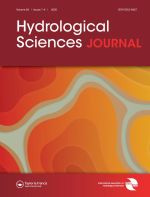 Hydrological Sciences Journal provides a forum for original papers and discussion of significant developments in hydrological science and practice, and related disciplines.
Hydrological Sciences Journal provides a forum for original papers and discussion of significant developments in hydrological science and practice, and related disciplines.
The Impact Factor of HSJ is 2.186 with a 5-Year Impact Factor of 2.564 (©2020 Clarivate Analytics, 2019 Journal Citation Reports®).
Institutions and libraries should order direct from Taylor & Francis: www.tandf.co.uk/journals/thsj, or their usual agent.
Special journal subscription rates are available to IAHS Members: £27.00 for a personal online subscription, and £48.00 for a personal online + print subscription. IAHS Members should order by contacting info@iahs.co.uk
Access to the back archive is free - explore 63 volumes of cutting-edge research and discovery.
IAHS members from the following countries are eligible for 80% discount on book prices, subject to the minimum price restriction, and free online access to HSJ via the IAHS website:
Afghanistan, Albania, Algeria, Angola, Armenia, Azerbaijan, Bangladesh, Belarus, Belize, Benin, Bhutan, Bolivia, Bosnia and Herzegovina, Botswana, Bulgaria, Burkina Faso, Burundi, Cabo Verde, Cambodia, Cameroon, Central African Republic, Chad, Colombia, Comoros, Congo, Côte d'Ivoire, Cuba, Democratic People's Republic of Korea, Democratic Republic of the Congo, Djibouti, Dominican Republic, East Timor, Ecuador, Egypt, El Salvador, Eritrea, Ethiopia, Fiji, Gabon, Gambia, Georgia, Ghana, Guatemala, Guinea, Guinea-Bissau, Guyana, Haiti, Honduras, India, Indonesia, Iran (Islamic Republic of), Iraq, Jamaica, Jordan, Kazakhstan, Kenya, Kiribati, Kosovo, Kyrgyzstan, Lao People's Democratic Republic, Lesotho, Liberia, Libya, Macedonia, Republic of, Madagascar, Malawi, Mali, Marshall Islands, Mauritania, Micronesia, Moldova, Mongolia, Montenegro, Morocco, Mozambique, Myanmar, Namibia, Nepal, Nicaragua, Niger, Nigeria, Pakistan, Palestine, Papua New Guinea, Paraguay, Peru, Philippines, Rwanda, Saint Vincent and the Grenadines, Samoa, Sao Tome and Principe, Senegal, Serbia, Sierra Leone, Solomon Islands, Somalia, South Africa, South Sudan, Sri Lanka, Sudan, Swaziland, Syrian Arab Republic, Tajikistan, Tanzania, Thailand, Togo, Tonga, Tunisia, Turkmenistan, Tuvalu, Uganda, Ukraine, Uzbekistan, Vanuatu, Vietnam, Yemen, Zambia, Zimbabwe
List of eligible countries with GDP per capita smaller than the median of all countries of the world (UN data, 2016)
N.B.This list is subject to revision.
International Hydrology Prize – Call for nominations
The International Hydrology Prize is awarded annually by IAHS, with UNESCO and WMO, to two people who have made an outstanding contribution to hydrological science. More information, including the list of previous awards, is available at
https://iahs.info/About-IAHS/Competition--Events/International-Hydrology-Prize.do
Nominations for the Prize are made by National Committees to IAHS, National Committees to the UNESCO-IHP or National Hydrological Advisors to the WMO, and forwarded to the Secretary General of IAHS for consideration by the Nomination Committee. The Committee consists of the President and a Vice-President of IAHS, as well as representatives from UNESCO and WMO.
Two medals are awarded under the International Hydrology Prize: the Dooge medal and the Volker medal. Both medals are intended to distinguish outstanding achievements by hydrological scientists but with a different focus. The Dooge medal is aimed at fundamental contributions to the science of hydrology, whereas the Volker medal is aimed at outstanding applications of hydrological science for the benefit of society at large.
The following applies to both the Dooge and Volker medals:
- The International Hydrology Prize shall be awarded to persons who have made outstanding contributions to hydrology such as confers on the candidate universal recognition of his or her international stature.
- The contribution should have an identifiable international dimension extending beyond both the country of normal work and the specific field of interest of the candidate.
- The medals may be awarded to hydrologists of long international standing or to younger but active hydrologists who exhibit qualities of international leadership in the science or practice of hydrology.
- An active involvement in the work of IAHS and other international organisations in the field of hydrology should be counted as an advantage.
Specific considerations for the Dooge medal:
- The Dooge medal is particularly intended for hydrologists who have demonstrated scientific excellence, and have made fundamental contributions to the science of hydrology as evidenced by publications in the international scientific literature and other evidence of high standard.
- Preference should be given to candidates who have recently exhibited outstanding international leadership in the science of hydrology.
Specific considerations for the Volker medal:
- The Volker medal is dedicated for hydrologists who have applied their research and hydrological expertise to the benefit of society, addressing issues of public interest and development.
- Applications of hydrology to the benefit of developing countries would count as an advantage.
- Preference should be given to candidates who have contributed through both scientific and practical work, and who have made outstanding contributions to the Hydrology community as demonstrated by active involvement in the work of IAHS or other international hydrological associations.
Nomination format and procedure
Nominations should be received by the Secretary General of IAHS no later than 31 December 2020 – Christophe Cudennec at cudennec@agrocampus-ouest.fr – and consist of:
- a (max. 2, pages A4 format) nomination letter signed by a National Representative to IAHS, the President of a national committee of UNESCO-IHP, or a National Hydrological Advisor to the WMO, with one sentence citation (max. 200 characters), and stating why the nominee is the most qualified person to receive the Volker or Dooge medal, paying attention to the medal's dedication specified above;
- the nominee’s CV (max. 3 pages, A4 format) with an emphasis on the contribution to hydrological science and international scientific cooperation, providing clear information on the main criteria used for the evaluation and the specific considerations mentioned above.
- a list of the major scientific publications (max. 2 pages, A4 format).
Nominations are expected from the world diversity, and equally for female and male candidates.
Evaluation criteria
a) Outstanding contributions to hydrology evidenced by universal recognition of his or her international stature.
b) Identifiable contributions with international dimensions extending beyond both the country of normal work and the specific field of interest of the candidate.
c) For senior candidates prove of Hydrologists activities of long international standing, or for younger candidates, prove of being active hydrologists with qualities of international leadership in the science or practice of hydrology.
d) Active involvement in the work of IAHS and other international organizations in the field of hydrology is counted as an advantage.
e) Application of the hydrological research performed and the use of his/her expertise to the benefit of society and addressing issues of public interest and development.
f) Applications of hydrology to the benefit of developing countries counts as an advantage.
Publication of first Community paper on Citizen science AND HYdrology - CANDHY
The IAHS Citizens and Hydrology (CANDHY) working group was established at the IAHS Scientific Assembly in Port Elizabeth in July 2017.
CANDHY promotes multidisciplinary and trans-sectorial research integrating hydrology, and earth science with citizen and data science. The focus is to organize, share and disseminate ideas, tools, data and scientific knowledge gathered from multidisciplinary and trans-sectorial researches developing and testing innovative procedures and tools implementing crowdsourcing collaborative platforms, communication and outreach activities, active citizenship and public participation for water resource management.
CANDHY cooperates with the IAHS Measurements and Observations in the XXI Century (MOXXI) WG in addressing Panta Rhei science questions 1 and 5 that focus respectively on the identification of key gaps in the understanding of hydrological change, and on advancing monitoring and data analysis capabilities, also through opportunistic sensing, to predict and better manage hydrological change. CANDHY and MOXXI WGs merge efforts to address the Unsolved Problems in Hydrology (UPH) initiative defining the UPHs of the “Measurement and Data” section (UPHs 16, 17, 18) as well as the questions about the “Interfaces with society” (UPHs 21, 22, 23).
The newly published community paper identifies the fundamental components, thematic areas, and specifications of citizen science projects giving them structure and direction to advance research and achieve scientific breakthroughs in hydrology. The authoring team represent several universities and ongoing citizen science projects, WMO and IWMI secretariats, as well as UNESCO chairs across the World. The Hydrological Sciences Journal paper entitled ‘Citizens AND HYdrology (CANDHY): conceptualizing a transdisciplinary framework for citizen science addressing hydrological challenges’ is available open access at https://www.tandfonline.com/doi/full/10.1080/02626667.2020.1849707 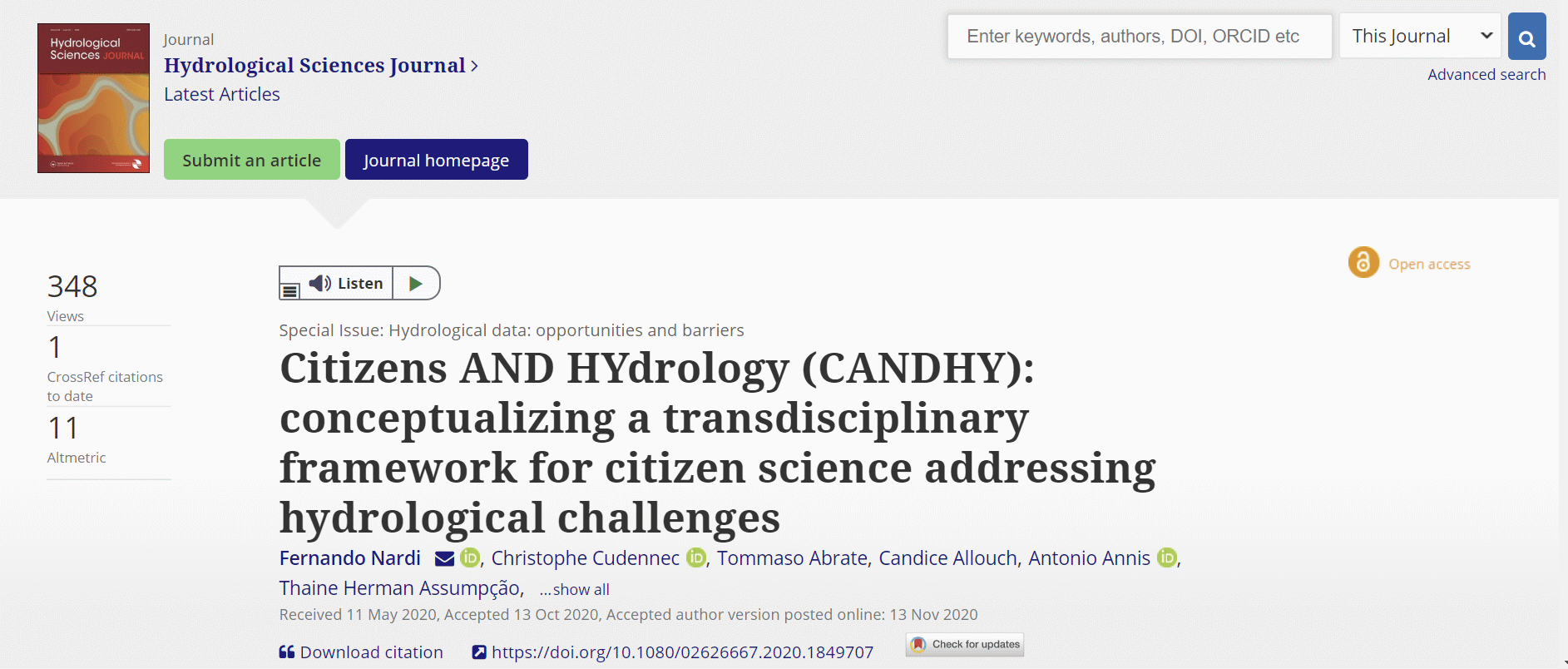
Become a CANDHY friend and/or a member of the working group via https://iahs.info/Commissions--W-Groups/Working-Groups/Candhy.do
The aims of the CANDHY WG align with the IAHS Measurements and Observations in the XXI century (MOXXI) WG. The free access community paper outlining the objectives of MOXXI can be found in the HSJ - https://doi.org/10.1080/02626667.2017.1420191
The CANDHY WG contributed to the Unsolved Problems in Hydrology (UPH) initiative defining the UPHs of the ‘Measurement and Data’ section and the questions about the ‘Interfaces with society’. Information on the UPH initiative can be found in the HSJ open access paper - https://doi.org/10.1080/02626667.2019.1620507
New date for the IAHS Scientific Assembly Montpellier 2022
Save the date: IAHS 2022 Scientific Assembly
Due to concerns over travel during the current pandemic the IAHS have decided to delay the next Scientific Assembly of the International Association of Hydrological Sciences (IAHS 2022). We confirm that the meeting will take place in Montpellier, France from 29 May to 3 June 2022.
This important biennial event will provide an opportunity to communicate, exchange and project on all major topics in the hydrological sciences within the framework of sessions organized by all IAHS Commissions and Working Groups with partners.
IAHS 2022 will have three major focuses:
· Panta Rhei decade (2013-2022) on change in hydrology and society
· UPH initiative, "Unsolved Problems in Hydrology"
· the 100th anniversary year of IAHS
This event will be accompanied throughout this week by many other "water-related" events for scientists, the general public and schoolchildren.
More information will follow soon.
